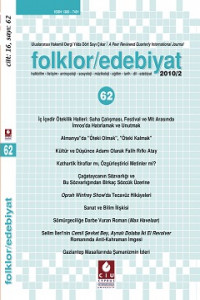Öz
“Dünya Müziği” bir müzik türü olmasının yanı sıra, müzik eğitimcileri tarafından çok
kültürlü müzik eğitiminin kapsamı içinde ele alınan ve özellikle son yirmi yıl içerisinde ilgili
literatürde sıklıkla kullanılan bir nitelemedir.
“Dünya Müziği” tanımlaması ve onunla ilintili eğitim uygulamaları, müzik eğitiminde
küresel algılamanın ortak bir payda kazanmasında, popüler kültürün kolaylıkları nedeniyle
müzik eğitimine ilişkin bir strateji haline de dönüştürülmüştür.
Postmodern yönelimlerle koşut biçimde ilerleyen söz konusu eğitim stratejilerinin Hollanda
örneğini ortaya koyan araştırmalar üzerinden değerlendirilmesi ve bu değerlendirmelerin ışığında
müzik kültürümüze yansıyan veya yansıyabilecek olumsuz yönlere ilişkin çeşitli saptamalarda
bulunmak makalemizin konusunu oluşturmaktadır.
Anahtar Kelimeler
Kaynakça
- Aslanoğlu, R. (1998). Biri Kültürel Karışım Olarak Küreselleşme, A. Yaşar Sarıbay, E. Fuat Keyman, (Der.), Küreselleşme, Sivil Toplum ve İslam, Vadi Yayınları, Ankara.
- Connor, S. (2001). Postmodernist Kültür, Çeviren: Doğan Şahiner, Yapı Kredi Yayınları, İstanbul.
- Evelein, F. (2006). Pop and World Music in Dutch Music Education: Two Cases of Authentic Learning in Music Teacher Education and Secondary Music Education. International Journal of Music Education, Volume 24, Number 2, August.
- Goottdiener, M. (2005). Postmodern Göstergeler, Çevirenler: Erdal Cengiz, Hakan Gür, Arhan Nur, İmge Kitabevi, Ankara.
- Isme. (1992). Isme Proceedings of the 20th World Conference of the International Society for Music Education. Seoul, Korea.
- Schippers, H. (1996). Teaching World Music in the Netherlands, Twords a Model for Cultural Divertsy in Music Education, International Journal for Music Education.
- Sell, D. (1992). Multicultural Music Education: Some Assumptions and Dangers. Isme Proceedings of the 20th World Conference of the International Society for Music Education. Seoul, Korea.
- Treanor, P. (2003). Çeviren: Uğur, Ü.Üngör, Çok Kültürlülük Neden Yanlıştır? [Çevrimiçi ]
- http://web.inter.nl.net/users/Paul.Treanor/index.html.
- Wagner, P. 2005; Modernliğin Sosyolojisi, Çeviren: Mehmet Küçük, Ayrıntı Yayınları, İstanbul
Öz
Besides “World Music” is a music genre, it is also a definition which is frequently used
in the related literature especially in the latest twenty years and assessed within the scope of
multicultural music education by music educators.
In providing a common ground for a globalized perception in music education, the
definition of “World Music” and the related educational programs were also changed into a
strategy regarding music education thanks to the facilities of popular culture.
The aims of the present article are to assess some studies on the related educational
strategies which progress in parallel with postmodern trends in Netherlands and in the light of
these assessments, to perform some determinations related to the negative aspects that reflect or
can reflect on our music culture.
Anahtar Kelimeler
Kaynakça
- Aslanoğlu, R. (1998). Biri Kültürel Karışım Olarak Küreselleşme, A. Yaşar Sarıbay, E. Fuat Keyman, (Der.), Küreselleşme, Sivil Toplum ve İslam, Vadi Yayınları, Ankara.
- Connor, S. (2001). Postmodernist Kültür, Çeviren: Doğan Şahiner, Yapı Kredi Yayınları, İstanbul.
- Evelein, F. (2006). Pop and World Music in Dutch Music Education: Two Cases of Authentic Learning in Music Teacher Education and Secondary Music Education. International Journal of Music Education, Volume 24, Number 2, August.
- Goottdiener, M. (2005). Postmodern Göstergeler, Çevirenler: Erdal Cengiz, Hakan Gür, Arhan Nur, İmge Kitabevi, Ankara.
- Isme. (1992). Isme Proceedings of the 20th World Conference of the International Society for Music Education. Seoul, Korea.
- Schippers, H. (1996). Teaching World Music in the Netherlands, Twords a Model for Cultural Divertsy in Music Education, International Journal for Music Education.
- Sell, D. (1992). Multicultural Music Education: Some Assumptions and Dangers. Isme Proceedings of the 20th World Conference of the International Society for Music Education. Seoul, Korea.
- Treanor, P. (2003). Çeviren: Uğur, Ü.Üngör, Çok Kültürlülük Neden Yanlıştır? [Çevrimiçi ]
- http://web.inter.nl.net/users/Paul.Treanor/index.html.
- Wagner, P. 2005; Modernliğin Sosyolojisi, Çeviren: Mehmet Küçük, Ayrıntı Yayınları, İstanbul
Ayrıntılar
| Diğer ID | JA64TG27RF |
|---|---|
| Bölüm | Araştırma Makaleleri - Research Articles |
| Yazarlar | |
| Yayımlanma Tarihi | 1 Haziran 2010 |
| Yayımlandığı Sayı | Yıl 2010 |
Derginin yayım dili Türkçe ve İngilizce’dir, ayrıca Türkçe de olsa tüm basılan makalelerin başlık, öz ve anahtar sözcükleri İngilizce olarak da makalede bulunur. Hakemlerden onay almış Türkçe makaleler için 750-1000 sözcükten oluşan genişletilmiş özet (extended summary) gereklidir. Elektronik çeviriler kabul edilmez.
Dergi TR-Dizin, Web of Science (ESCI), DOAJ ile diğer pek çok dizin tarafından taranmaktadır. Scimagoe quartile değeri: Q2 'dir:
TR DIZIN 2020 Etik Kriterleri kapsamında, dergimize 2020 yılından itibaren etik kurul izni gerektiren çalışmalar için makalenin yöntem bölümünde ilgili Etik Kurul Onayı ile ilgili bilgilere (kurul-tarih-sayı) yer verilmesi gerekecektir. Bu nedenle dergimize makale gönderecek olan yazarlarımızın ilgili kriteri göz önünde bulundurarak makalelerini düzenlemeleri önemle rica olunur.
Alan Editörleri/ Field Editörs
Halkbilimi/Folklore
Prof.Dr. Hande Birkalan-Gedik (JohannWolfgang-Goethe İniversitet-birkalan-gedik@m.uni-frankfurt.de)
Prof.Dr. Ali Yakıcı (Gazi Üniversitesi-yakici@gazi.edu.tr)
Prof.Dr. Aynur Koçak (Yıldız Teknik Üniversitesi-nurkocak@yildiz.edu.tr)
Prof.Dr. Işıl Altun ( (Regensburg Üniversitesi/Kocaeli Üniversitesi-İsil.Altun@zsk.uni-regensburg.de)
Edebiyat/Literature
Prof.Dr. Abdullah Uçman (Mimar Sinan Güzel Sanatlar Üniversitesi -emekli-29 MayısÜniversitesi-abdullahucman@29mayis.edu.tr
Prof. Dr. Ramazan Korkmaz (Ardahan Üniversitesi-emekli-Kafkasya Üniversiteler Birliği -KÜNİB-r_korkmaz@hotmail.com)
Prof.Dr. Emel Kefeli (Marmara Üniversitesi-emekli-İstanbul 29 Mayıs Üniversitesi-ayseemelkefeli @gmail.com)
Prof.Dr. Zekiye Antakyalıoğlu ( İstanbul Aydın Üniversitesi-zekabe@hotmail.com)
Antropoloji/Anthropology
Prof.Dr. Hanife Aliefendioğlu (Doğu Akdeniz Üniversitesi-hanife.aliefendioglu@emu.edu.tr)
Prof. Dr. Şebnem Pala Güzel (Başkent Üniversitesi-sebnempa@baskent.edu.tr)
Prof.Dr. Derya Atamtürk Duyar (İstanbul Üniversitesi-datamturk@istanbul.edu.tr)
Prof.Dr. Meryem Bulut (Ankara Üniversitesi-meryem.bulut@gmail.com)
Dil-Dilbilim/Language-Linguistics
Prof.Dr. Nurettin Demir (Hacettepe Üniversitesi-demir@hacettepe.edu.tr)
Prof. Dr. Aysu Erden (Maltepe Üniversitesi-aysuerden777@gmail.com)
Prof.Dr. Sema Aslan Demir (Hacettepe Üniversitesi-semaaslan@hacettepe.edu.tr)


